Angela Slatter's Blog, page 84
May 10, 2015
The Sourdough Posts: The Navigator
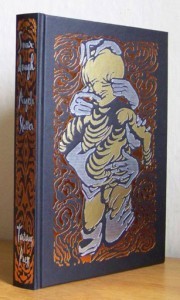 I’m very fond of this story – I wrote it at Clarion South and after it had seven shades of brown kicked out of it during the crit session, Jack Dann, who was our pack leader for week five said “If I was looking for stories for an anthology right now, I would buy this story.” Understandably, I am also very fond of Jack Dann.
I’m very fond of this story – I wrote it at Clarion South and after it had seven shades of brown kicked out of it during the crit session, Jack Dann, who was our pack leader for week five said “If I was looking for stories for an anthology right now, I would buy this story.” Understandably, I am also very fond of Jack Dann.
The story began with the image of a man with wings, soaring up into the blue sky above a calm sea. In the final draft the perspective changed as I realised it was a recounted tale from someone else’s point of view: that of the nameless narrator. She’d loved Windeyer, the Navigator, one of the last of his kind, winged men who kept ships on course due to their avian instincts. But the Navigators were essentially slaves, kept on ships, not employed on them. Windeyer, whose wings were taken from him, had found a way to get them back and there was nothing he wouldn’t give in exchange.
The female narrator loves him, but she’s also the daughter of the man who maimed Windeyer; she carries her guilt around tightly entwined with her love. Her father was a man called Balthazar Cotton, who appeared briefly in “Gallowberries” – and who also appears in my Tor.com novella, Of Sorrow and Such (due in October 2015) – and the sense I had of her was that her life had shrunk. Her parents were gone, her shipping empire had been whittled away gradually, and Windeyer no longer loved her as much as he loved his obsession with getting his wings back. And as things and people were subtracted from her life, nothing came to replace them, so the emptiness grew.
An important thing for me with this tale is the ending: I wanted to leave a sense of unknowing, of a continuation of the story after the last full stop. To leave the reader forever caught between was she saved or wasn’t she? Coz I’m cruel like that.
The Navigator
Windeyer perches atop the mast, face to the wind, eyes (all pupils) unblinking. His shoulders twitch as if the stumps of his wings itch and ache. Some days, when he’s aloft like this, I think I can see the sun shine through him, his bones a dark frame beneath his skin. Perhaps I imagine it. He should have been able to fly; they should have left him that.
Not many ships have Navigators such as he anymore; his kind began dying out twenty years ago. Pining, avian-human diseases, masters who got sick of having to retrieve runaways and, in frustration, transected them with a crossbow bolt. It was, I think, a kind of mass suicide, a tribal loss of the will to live. With their wings taken, with no freedom, what was the point?
He moves and I tense. In a fluid movement he dives from the mast, from the very top, into the sea. I watch, fearful that he won’t come up, will founder like his father. That he will drink in the sea instead of the air and chose to sleep on the sandy bottom. At last, he surfaces.
I do not chide him. His cruelties are few and this is the worst of them: to endanger himself in front of me. Some days he won’t talk. I feel, more and more, this distance between us, his lack of wings and mine.
‘How much longer?’ I ask as he hauls himself over the ship’s rails. I’m relieved to see he doesn’t consult the map. It’s drawn on human skin and I do not wish to think on how he came by it. He reaches out and runs his fingers down my face, leaving salt and water there, writing my tears for me.
‘Another day, another night. Afraid?’
I shake my head.
‘It’s not too late,’ he says. ‘We can still turn back. You can marry your way out of poverty.’
‘Or I can sell you. That would clear all debts.’
It hangs between us, bitter fruit. I turn away and fix my eyes on the endless horizon. The wheel under my hand is sweet.
*
Windeyer was sired on a human whore by my father’s navigator, Desidero. The woman

(c) Manchester City Galleries; Supplied by The Public Catalogue Foundation
had waited for a year until the North Star returned to port and then presented the surprised sire with a babe in arms, whose metre-wide wing-span took one’s breath away. She demanded money in exchange for her son. Desidero begged my father to buy the boy.
Desidero was wild, his wings clipped late, but he found some bond with my father and stayed. Behaved abominably but stayed. It must have been something more than a shared interest in whoring that kept them together, must have been a kind of friendship, for in spite of his wildness, Desidero never tried to run. He loved the ship and he loved my father. Perhaps it would have been better for him to flee for he died in a storm when his son was five.
I was born six years after Windeyer. Mother was a fine lady of good family who’d married my merchant father and expired with the shock of giving birth to me. Balthazar Cotton didn’t entrust me to a governess as a proper father should: I was carried around in a small woven cocoon, hung on the nearest mast when he needed both hands free, always carefully shielded from the sun. My father, born in a landlocked city, discovered late in life that he loved the sea; I was born to it. So much time did I spend at sea that solid land always felt foreign to me. The inland air I breathed when Father took me on visits to his birthplace of Briarton, was free of salt and soak; it tasted wrong.
Windeyer was given guardianship of me – to teach him responsibility my father said – and he looked after me as well as a brother might. In those early years his wings had not been taken and he would sweep me up and we would fly above the ocean as the ship floated beneath us. This was his gift to me: to know what it was like to soar on the thermal currents, to see things the way the gods do, to feel unbounded by earth and dirt and gravity.
And I took that from him.
*
The night air is clean, salty. I breathe it deep and hold it in my lungs as long as I can; as if every breath counts. We are anchored outside the reef surrounding the island of the Sirens. I would not risk the passage in darkness, so Windeyer has been forced to wait. He sulks in the bow, his back to me. I think I see the shadow his wings once cast.
‘I have a way out,’ he said not so many weeks ago. This is the only ship left in the fleet I inherited from my father: a small sloop, just barely manageable by the two of us. The others have been variously lost: storms and sea monsters; one commandeered by the Royal Navy and subsequently destroyed by pirates; and one lost in a regrettable card game for which I blame Windeyer entirely.
There is still the house, the white and iron mansion perched on the gentle hill above the port-city of Breakwater. But it is mostly emptied of furniture, all but our bed and cooking utensils for those brief times when we are at home and not scouring the sea for some kind of commerce, stopping short of piracy as much as possible. Transporting as many small cargos and paying passengers as we can to keep body and soul together. I have had to let the crew go, one by one, to ships where they are guaranteed pay.
I could, as Windeyer taunts, marry: there are several suitors, all rich and fat and well-connected. They would keep me in a sugar-spun web of boredom, leave me to learn to embroider and raise round little children, the boys replicas of their father, and the girls tiny versions of a caged mother going slowly mad.
‘Sirens’ bones,’ he said to me and might well have been a siren himself (he carries their blood, though diluted by years and generations). ‘Remember mine? Think of what pure Sirens’ bones will fetch.’
When my father ordered Windeyer clipped, he had the great black wings nailed to the main mast of the North Star. They stayed there until at last the feathers and flesh fell away and left glorious bright bones that clattered to the deck and proceeded to sing. Father had them bundled up and sold as soon as we made port. With the proceeds he bought another ship.
‘Why would the Sirens give up their bones to us, Windeyer?’ I asked.
‘We only need one set – we don’t even need a full set. We don’t need to ask. The bones will be lying about.’
‘How do you know?
‘They build wooden towers for their dead. They leave the bodies to rot. The towers fall and the bones litter the island. I read it in Murcianus.’
‘No one is allowed on the island.’
‘Pilgrims are. Navigators are. My kind are welcome.’ His eyes darkened and I couldn’t quite divine if he was bitter or pleased.
And I agreed, at last, even though I knew he had told me truth with a lie rolled up tightly inside.
***
May 6, 2015
The Sourdough Posts: Dibblespin
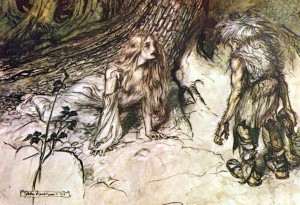 “Dipplespin” was a story that came about at Clarion South in 2009 – and a big thanks to Sean Williams for giving me some pointers on how to hone it.
“Dipplespin” was a story that came about at Clarion South in 2009 – and a big thanks to Sean Williams for giving me some pointers on how to hone it.
I had the image in my head of flowers that actually lit up a clearing, a house with a pretty girl in it and a not-so-pretty girl watching her. They were half-sisters I realised, and friends. There was a bitter woman, Olwen, who truly hated the not-so-pretty girl, Dibblespin, because she was proof of the infidelity of her husband (the husband is father to several girls throughout this book). Olwen (who is the baby Patience Sykes rescues in “Gallowberries”), chooses to become a wolf part of the time; she makes her own little pack of children, too, to keep her company.
Dibblespin is part human, part troll, but has no harm in her. She loves her sister, Ingrid, who loves her in return, but perhaps less so because of her beauty she is more inclined to expect love than give it. Unlike trolls, Dibblespin loves sunlight; she’s clever and kind, but judged only on her appearance. I made up her name, riffing on Rumplestiltskin, the sound of it a little nonsensical, yet kind of melodic in a strange way, a bit like the girl herself. She appears again later in the story “Lavender and Lychgates”.
I wanted two sisters and a kind of ‘wicked stepmother’ as characters, to explore and in some ways invert the usual fairy tale tropes of half-sisters who usually hate each other and stepmothers who are always inimical to children not their own. I wanted Ingrid’s betrayal to be one of omission rather than action.
Dibblespin
Ingrid knows the woods better than anyone except me. She recognises every tree, rock, leaf and can easily tell one from another. The thick underbrush parts quite willingly when she walks through, because it recognises her in return.
‘Dibblespin,’ she says, ‘things are moving in the forest.’
‘Things always move there,’ I reply.
She shakes her head, silvery hair rippling like water. ‘Dark things. Something is awake. I hear wolves outside my garden at night.’
‘Not your mother?’
Ingrid fears nothing in this place. She has lived there all her life. So did her parents and both sets of grandparents, who Ingrid says she sees sometimes, in new forms: Grandma Finkel is a squirrel; Grandpa Ezza is a bright-eyed bird with blue feathers; Grandma Pandy is the large toad who lives under the water barrel out back of the cottage; Grandpa Sidle is the tabby cat, spending his time by the hearth fire. Father is the dormouse who lives in the walls and her mother, Olwen (free of familial constraints) has become a grey-eyed wolf.
‘Never my mother at night.’ She hesitates. ‘They seem to sing, but not with wolf-voices. They sound like children.’
For the first time, she is afraid. I can smell it on her skin; it seeps through the pores like sickness. She plays with the silver knife that hangs at her belt, its hilt shaped like a wolf’s head.
I do not know what makes me ask again, but I say ‘Your mother, Ingrid. Have you seen her?’
She lowers her green eyes and lies when she answers, ‘No.’
My sole inheritance from our father are my green eyes and bright red hair. From my mother came my large nose, heavy brow, harsh chin, flappy ears, long fingers, monstrously large feet and hunched shoulders. Needless to say my mother was not Ingrid’s mother. More than reason enough to hide from someone as beautiful as Ingrid, if she was not so kind – and more than reason enough to hide from Olwen.
*
That night I sleep sweetly in the arms of an ancient oak, thick of trunk and sturdy of limb. The trees are so densely branched and close together that I can travel through the tree-tops, stepping lightly from bough to bough, and make a bed of them when I need to.
I do not spend much time indoors. I do not like it. When my mother turned to stone (branches above broke and fell, letting sunlight pierce down like a lance to catch her on its point), I burned down her hut. I hated its dark corners and sour smells; nothing good ever happened to me there.
Ingrid’s cottage was once in a clearing but the years have encouraged the forest to grow back and Ingrid’s father and grandfathers had no inclination to argue. There is a small yard, a tiny garden, hedged in by young trees, not as much girth to them as the old ones, but trying hard to reach higher, grow wider. In the garden are all manner of flowers that bloom year-round to spite winter. The yellow ones keep the space around the cottage bright so the lack of sun doesn’t matter much. At night, they close their lovely faces and go to sleep.
Ingrid knows eyes watch her from behind bushes and rocks, but it bothers her not at all. I like, sometimes, to simply observe my sister. She is so beautiful; I do not look at my reflection in the stream or pond. I pretend we share the same face. She doesn’t call me ‘stinky’ or ‘dirty’ or ‘ugly’ or ‘troll’. When she smiles her teeth show straight and white; mine are snarled and yellowy.
I wonder still what her father saw in my mother. Part witch, part troll-wife, she lived in the deepest part of the woods, where no sun shone at all and no blossoms grew to give light. He did not spend all his time in the cottage. For weeks at a time he would go into the city not far from here, with its great walls and imposing cathedral and neat palace, and live there. Perhaps he wandered on his journey home, got lost, found the ramshackle hut the foul thing called home. Perhaps she threw an enchantment over him so he thought her palatable (if I am ugly, my mother was worse still). She let him go only when she knew he’d finally planted a seed. Nine months later I appeared, and Ingrid had a half-sister.
Her grandparents died, one by one; then our father. I saw him only a few times in my life, never close enough to touch. When chopping wood, he missed the block and took off his foot. No one was around to help stem the flow of blood. Olwen wandered away the very next day, making her way among the trees until she was just a speck of dancing red, and then nothing at all. She came back six months later to drink from the rainwater barrel, but on four legs instead of two, and politely ate pieces of meat from Ingrid’s hand.
*
I am woken by the scuffling and snuffling at the base of my tree. There is a low growl and I 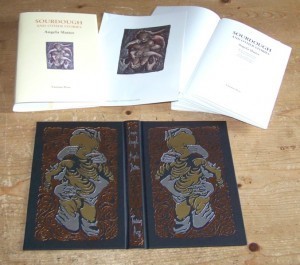 can hear claws determinedly trying to reach my perch.
can hear claws determinedly trying to reach my perch.
But I am up too high, and the shadowy thing with flashing eyes cannot climb. It has my scent though. I try to peer into the darkness, to discern what waits so impatiently. There is only the glow of eyes; more than one pair, a forest of red glares up at me.
One by one, the owners of those glittering orbs begin to sing. It starts as a howling, but soon enough the chorus melds and twines into a tapestry of voices, the unalloyed joy of children. They embroider a folk song, a fairytale set to music, so the ideas dance in my mind, sugar-pink girls and bold boys, hand in hand moving through the woods. There is nothing else to be done, so I let them sing me to sleep.
***
May 1, 2015
Make Contact 2016!
 Next year Brisneyland is hosting the NatCon and you know you want to be there. It’s over the Easter Weekend so there will be lots of chocolate, and the heat won’t be too awful so said chocolate won’t melt before you eat it! (Like it even had a chance.)
Next year Brisneyland is hosting the NatCon and you know you want to be there. It’s over the Easter Weekend so there will be lots of chocolate, and the heat won’t be too awful so said chocolate won’t melt before you eat it! (Like it even had a chance.)
Early bird memberships have been extended for a couple of days, so go here and snag one. Remember: chocolate.
April 30, 2015
The Sourdough Posts: Little Radish
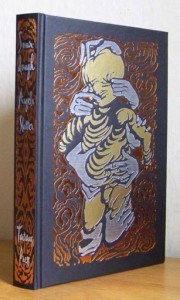 I think one of the things that has always annoyed me about Rapunzel stories is that everything that happens to her is forced upon her. She’s seldom a vessel for agency: she’s bartered away by her parents for radishes or bitter greens or whatever-vegetable-takes-your-fancy; she’s locked in a tower and turned into a companion who knows nothing of the world; the prince turns up and takes advantage of her; she ends up as a single mother thrown out of the only home she’s known and wandering.
I think one of the things that has always annoyed me about Rapunzel stories is that everything that happens to her is forced upon her. She’s seldom a vessel for agency: she’s bartered away by her parents for radishes or bitter greens or whatever-vegetable-takes-your-fancy; she’s locked in a tower and turned into a companion who knows nothing of the world; the prince turns up and takes advantage of her; she ends up as a single mother thrown out of the only home she’s known and wandering.
What I wanted for my Rapunzel was choice. I wanted her to make decisions instead of being tossed around by everyone else’s needs and wants. I wanted her to be someone who didn’t acquiesce all the time, who wasn’t an appeaser. I wanted her to have agency; so she chose the tower. She chose a quiet life. The witch in the tale has no vested interest in Rapunzel, she’s not a lonely old hag, and she becomes a friend. The prince, like most princes, is something of a putz, but he gets punished and by the end I like to think he’s learned his lesson.
And Rapunzel is not sweet and neat. She does a terrible thing on the spur of the moment, all clothed in rage. And she has to deal with the consequences of her actions and her life. Her son is called ‘twice-born’, which links him to the king in “The Shadow Tree” … it’s obvious he’s not grown up well despite his parents’ lessons … I sort of felt that the anger and the bitterness that accompanied his conception were always going to show out at some point.
This story was first published at Crimson Highway back in 2008; it was only when I was writing the other stories that would eventually become Sourdough and Other Stories that I realised it fit into that cycle, though it is the only tale amongst them that has a direct link to a known fairy tale.
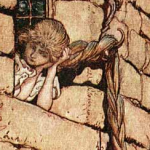
Arthur Rackham’s Rapunzel
Little Radish
All I ever wanted was the tower.
I dreamt of it when night coloured the sky. When the sun threw yellow light over everything, I would lose myself in daydreams of the silence of stone resting upon stone. Since I was small, the thought of it had been with me.
There was no tower near my home. Not even a castle. We lived so deep in the woods there were only cottages scattered here and there. Neighbours were few and far between: woodsmen; old women deserted by their families, despised and feared; brigands; folk who simply liked the quiet of the woods.
My mother loved radishes beyond reason, so it’s only proper that I should have a mania all of my own.
I lived in quietude, but I longed for utter silence. I imagined a stillness like nothing else, held in by granite, a barrier that nothing could penetrate. I desired air untroubled by the vibrations of sound, a vacuum through which nothing could pass.
My parents did not understand. Distance grew between us. We could sit in the same room yet not speak, not touch, not even breathe in time. They gave up trying to communicate with me and I happily wrapped myself in the fabric of nothing, of utter quiet. My siblings delighted in making noise, rough and tumble like puppies. I would flee to the forest to sit and eat the stillness.
When I was sixteen I wandered from home. I would, I thought, find the tower – it must be there, I could not simply have imagined it. Whatever it cost me, I would find it, for that was where I belonged.
*
I spent four days lost before I stumbled into a clearing. An old cottage sat, like a creature waiting for something to come; perhaps it wanted prey, perhaps company. Hunger and thirst propelled me and I fell against the door with a cry, crumpling to the stoop.
An old woman peered down at me. A walking stick held her upright. She wore a dress that had once been the colour of dark leaves but had been washed back to a faded green, a cap, and an apron stained with yellows and reds. Her glasses were smudged and she wrinkled her nose to move them back into position on her face.
‘Who are you?’ she croaked. She cleared her throat and tried again, the sweet timbre restored. ‘Sorry. Who are you?’
‘Rapunzel,’ I replied. She smiled.
‘Is your mother the one who’s nuts about radishes?’
I nodded wearily.
‘Come in. I’m Sybille.’
She fed me thick, buttery cheese with stodgy bread and gave me tea to drink. When I had finished wolfing it all down, we spoke.
‘So, what are you looking for, little radish girl?’
‘A tower. The tower. The one I’ve dreamt of my whole life.’
‘No towers around here,’ she answered.
‘Then I’ll keep walking until I find one.’
‘Stubborn.’
She sighed and got to her feet. A bookcase leaned haphazardly against one of the walls; she shuffled over, grabbing a thin tome from the warped shelves.
‘There used to be one. Don’t know if it’s still there. Some years ago it became invisible after some nasty business with a king not paying his due to a wise woman.’
‘You?’
‘Maybe it was and maybe it wasn’t,’ she hedged, pointing her finger at me. ‘Any road, there is a tower there for the taking. As you seem determined, you may as well have it.’
‘How do I find it if I can’t see it?’
‘Hold your horses, missy. Always in a hurry, young women.’ She clucked her tongue, opened the book, and flicked through it, running a finger down each page and muttering “nope” as she reached the bottom. After a time she gave an ‘ah ha’.
‘You’ll need the key, of course,’ she said and plucked one, ungainly and a little rusty, from the back of the ragged book. ‘Now, walk north for three hours and when you bump into something you can’t see, then you’re there.’
‘And?’
‘Say this: tower fair you seem not there, take pity on this girl and your glory now unfurl. That should do the trick.’
‘And if I should want it invisible again?’ I asked and she rolled her eyes.
‘Then – and make sure you’re inside first or you’ll have to mess about making it visible again so you can find it – say: tower clear and tower bright, fold yourself back into night.’ She rolled a lump of bread and cheese in a cloth and handed it to me. ‘I’ll come see you sometime.’
She pulled two small, carved stones from her pocket and held them out.
‘If you need anything, send the cat or the raven. Blow on them and say ‘bid your mistress come to me’. Sometimes you might want the cat for company, so blow and say ‘malkin black or malkin white, bring thy company into my sight’. He’ll sit around for as long as you want. To send him back try ‘malkin black or malkin white, get thy company from my sight.’
‘I’m not a witch,’ I said.
‘You’re a woman, aren’t you?’
I had to agree. I gave my thanks and was on my way. She watched me until I disappeared into the trees and, I suspect, for a long while after that.
***
SQ Magazine Issue 20
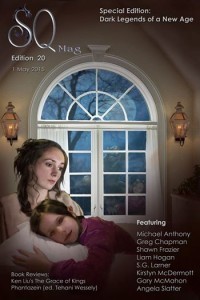 And here is the link to some quality free fiction from Kirstyn McDermott, Gary McMahon, and others including me.
And here is the link to some quality free fiction from Kirstyn McDermott, Gary McMahon, and others including me.
April 29, 2015
Sourdough – Graphic Novel
So one of the other projects Kathleen Jennings and I are working on (amongst all the other projects) is creating graphic novel versions of the Sourdough stories. Kathleen sent me some pages yesterday for the first story, which is, funnily enough, “Sourdough”. Soon we’ll start shopping these around to publishers.

April 28, 2015
The Sourdough Posts: Gallowberries
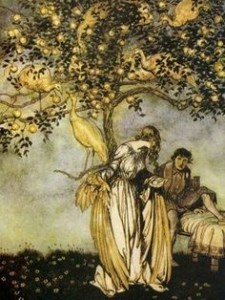
Arthur Rackham
“Gallowberries” was one of the stories I wrote while writing other stories for MA. It has all the same kinds of fairy tale themes but it’s not one of the re-written/re-imagined tales that went into Black-Winged Angels. In fact, I think it’s the first story I wrote that was an extension of all that I was learning about while studying, both in terms of theory and writing craft; it’s a synthesis, something I can look at and say ‘That’s where it began, that’s where I jumped off the cliff to see if I could fly.’
Mind you, it wasn’t easy – the story took four years to finish, for me to know what I needed to do with it, and for me to realise I’d been writing towards the Sourdough collection for quite some time. But that first image I had of the fruits growing beneath a gallows, thinking about what they might be able to do, fertilised by death, that was definitely the start.
I love Patience Sykes, she is without doubt one of my favourite characters – that’s why I wrote a novella about her for Tor.com (Of Sorrow and Such, out in October 2015). “Gallowberries” shows her beginning, “Sister, Sister” (one of the last stories in Sourdough) shows her in her old age, and Of Sorrow and Such shows her middle life. I’ve never killed her off and don’t know if I want to – I’m tidying up The Tallow-Wife and Other Tales at the moment and wondering if I might possibly put in another story about her, though by this point she’d be tremendously old even in the Sourdough world where, as a matter of course, folk live well beyond a normal span.
Gallowberries 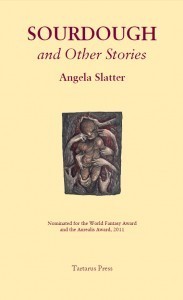
There were too many apples.
Far too many for the age of the trees, the time of year and the brevity of my stay. The orchard was small, but every branch fair drooped with fat fruits, boughs hung low and heavy. I, perched atop a rickety ladder, my apron filled with fragrant balls of red, sang loudly. What I harvested would not, could not have been there but for my magic. I was entirely pleased with myself.
‘Good day, mistress.’
His voice startled me.
Tall, olive-skinned and handsome, his expression was too dour and weary for his youth. His clothes, I noticed in the moment before I tried to climb down too fast, were sombre and travel-stained. I got tangled in my skirts and twisted a foot on one of the rungs and fell. Apples flew like hard rain.
Instead of crashing to the ground I was caught mid-flight. I felt muscles and the rub of rough fabric; the smell of man and horse was strong. He held me a moment longer than he needed to then put me carefully on my feet. I tried to stand but my ankle gave way and I found myself scooped up again.
‘May I?’ he asked belatedly and I nodded assent, fluttering my eyelashes. I wrapped my arms around him. The stiff white collar of his shirt was bright against the black of his jacket. Gently I touched the dark curls at the nape of his neck. He pretended not to notice, but from beneath lowered lids I could spy him stealing glances at me.
We rounded the corner to see Dowsabel feeding carrots to a long-legged ebony horse. She gave a cry and hurried forward.
‘Bring her inside. What have you done, Gideon Cotton? Patience, are you all right?’
I nodded, surprised that she knew him and addressed him so familiarly. I had not seen many visitors in the time I’d been with her, mainly tinkers and travelling salesmen. Then again, a lack of callers did not mean a lack of acquaintances. Dowsabel may well have lived on the fringe of Bitterwood, but it stood to reason that the townspeople knew of her and she of them.
She led him into the parlour and he put me gently on a long couch. He lifted both of my legs onto the worn padding, then pushed my skirts up to my knees. The right ankle seemed to swell even as we watched, the flesh hot and ruddy. His hands touched the heated skin and I shivered, as much from excitement as from the coolness of his palms. Dowsabel made a disapproving sound and bustled him aside. He blushed and stood awkwardly. His chin was raised as if to distance himself from the proceedings. I swallowed a smile.
‘What happened, Patience? Did he hurt you?’ Her words were harsh but her gaze told me it was more a joke than anything else; that she wanted to see how much leverage she might get out of his discomfort.
‘No, Dowsabel. He startled me, but I fell through my own clumsiness.’ I gave him the full force of my green eyes and he blushed ever darker. She had her back to him and shot me a grin he could not see. She put her slim hands around my ankle and I gasped for dramatic effect, all out of proportion to the pain I actually felt. The young man started guiltily.
Dowsabel rose and gazed at him. ‘Are you satisfied? I told you before you charged off into the orchard there is only myself and my young cousin, come to help while my husband is away.’
The lies sweetly rolled off her tongue. I noticed his eyebrows raised at the word “husband”, but otherwise he had the conscience to look ashamed.
‘My apologies, goodwife. I have become – obsessive in my pursuit and now I have caused injury.’ His shoulders sagged.
‘What do you seek?’ I asked, although I thought I knew the answer.
‘Someone who fled Bitterwood three months ago.’
‘Man, woman, girl, boy? Many pass through the town, Gideon, so you need to be more specific.’ She laughed and annoyance at the thought that this woman did not take him seriously flew over his handsome face.
‘How can you be ignorant of what happened, goodwife?’
‘You know very well, Gideon Cotton. Who comes to exchange news, good or bad, with the likes of me?’ she asked sternly, and he flinched. ‘So, I ask again: who do you seek?’
‘I don’t know. I don’t even know if the person exists. My father and the town council hanged – or tried to hang – a witch. Ever since that day our families have been afflicted – wells were poisoned. My parents and younger brother died. Cows were made barren and the fields are rotten with dead crops. I suspect she had an accomplice or a familiar, someone left behind to take revenge on us.’
‘What happened to the woman?’ I asked quietly.
‘She disappeared. One moment she was there, the next gone. Some devilry.’
‘So, why do you not think it was she who cursed you and yours? Why some invisible familiar?’ Dowsabel’s face had lost its customary gentleness but I couldn’t tell if she disapproved of him or the possible escapee.
‘I … we …’ It seemed this had not occurred to him. She touched his arm and his face cleared. Apparently Dowsabel was not without her own magic. I had not suspected.
‘Let me set your mind at ease, Gideon.’ She touched his forehead, speaking low. ‘We have seen none such as you have described, neither man nor woman, maid nor lad.’
He stood for a moment, enchanted. I was as transfixed by her as he was. Dowsabel smiled once more and said, ‘There is only we two.’
He stared at me and even though I knew he could not identify me, could not possibly know anything, I held my breath and felt sweat prickle my palms. At last he shook his head and tried a limp smile, which Dowsabel returned, hers brilliant and designed to dazzle. ‘Would you like refreshment before you continue on your way?’
‘No. No, I thank you, goodwife. I have been hunting rumour for so long I no longer know how to behave civilly. You are wise – it must have been the witch and there will be no finding a woman who can disappear at will.’
*
The fruits grow lush and glossy, uniformly round and enticing, but they have no smell, which may make you suspect something is wrong. When you bite into them, you know. Perhaps they are so foul because they contain the essence of transformation, of ultimate change. The gallowberries taste, without exception, of rotting flesh and spent seed – their garden lies at a crossroads, under the gallows where criminals are hung. The lives of such men shudder to a halt, their last breath and last pleasure simultaneous. With time the bodies rot, wind, rain, sun, air taking their toll on ephemeral flesh.
They break down, these gallowscrows, to all component parts – some of them are more useful this way. That is why my mother spent one of her evenings sixteen years ago lying beneath a gibbet, skirts about her waist, muttering words that made sense to few, but would have earned her a noose all of her own. The dead ones, she told me when I was old enough to understand, cause you far less trouble and seldom want anything in return. She was not beautiful, Wynne Sykes, and I think perhaps she found robbing the deceased easier than risking rejection. My looks, I was assured, came from a dead man; not his only gift.
‘Crossroads, Patience,’ my mother said one day as she gathered bright berries, ‘are funny things. Gateways to all sorts of places and not just north, south, east, or west.’ She held up one of the gallowberries with a grin. ‘And these can help unlock all manner of gates.’
So, when she was finally caught, some months later, cutting the hand from a hanged man, she was able to escape the rope and the salivating burghers who wanted to see her last choking moments. I watched from my roost in a tree. She stepped carefully out of the cart they’d brought her in, keeping her eyes on the road, looking for a shift in the air, for an almost imperceptible line that would tell her a crossing space was there.
I knew by her face when she’d found it, the half-smile twitching her lips, and the toss of her thin, pale hair. She popped one of the gallowberries she habitually carried into her mouth. As she moved forward, she spoke a word or two, bit down hard and blinked out of existence. Gone just like that, leaving seven confused and terrified men milling about, and me lying along a branch, with a sense of satisfaction and loss.
Take that, you bastards, I thought viciously. I was angry, but not so angry that I came down before they had all gone back to their cosy homes and their warm, ample wives and their smug, self-righteous town. I stood on the spot where she’d disappeared then sat in the dirt, searching for the path she had taken. It was beyond my pitiful abilities, though. She never taught me how to find those doorways, never taught me the words that acted as keys to other places.
Eventually I knew it was time to move on, that the ache of being left behind would work against me were I to give in to it. To be found where the witch had last been seen – who knew what the fearful, tiny-minded clowns of Bitterwood might make of that?
In the velvet darkness I visited the houses of those seven foremost men, the members of the town council, who’d judged my mother and brought her to the crossroads. The night before her hanging, I sneaked to the back window of the place where they’d held her. Her jailer, she’d whispered to me out of the bars of the cell, had been kind, as had his wife. I was instructed not to touch them. The seven, though, those fine upstanding citizens, were to be taken care of – whether I punished them or their families was irrelevant. Those left untouched would live in guilt and fear of what might visit them in times to come; any future misfortune would be viewed as something resulting from this day’s work. My mother had a fine mind for revenge.
I moved through the blackness like a fish through water, my eyes accustomed, pupils widening to swallow all the white. Perhaps this is the result of my strange conception, perhaps this is my father’s dead gift to me: the ability to see like a cat or a creature of under-earth, and other things besides. I poisoned wells at three of the houses. At the next two homes, I spoke lovingly to the cows as I rubbed their udders with an oil to curdle the milk therein and I fed them a mix of grasses and herbs to render them barren. At the last two residences, I stood at one end of the fields, held a powder of salt and sulphur, breathed malignant words across my palm and blew. Caught by eldritch winds, the particles drifted across the earth to settle into the soil, to kill the crops and prevent any fresh ones.
I was exhausted. Unlike white magic, which rewards its maker as well as its object, malign magic sucks the strength out of you. I knew I had to find somewhere to hide, to lie low before the sun rose and my deeds were discovered. If I tried to run, drained as I was, they would hunt me down as surely as day follows night; but if I stayed in close, hid in plain sight, I would have a good chance of surviving. No one had seen me, no one knew about me but if I were discovered walking determinedly away from the town with its ill-water and ruined livestock then questions would be asked. I did not want to return to the hut in which my mother and I had spent our last two nights together. I did not want to meet the memories that would surely wait for me there.
Once anger, grief and vigilance were dulled by time and fear, then I might again take to the roads.
I found a barn on the outskirts of town. It was rundown and inhabited by a few scrawny cows and ancient chickens, but the straw in the hayloft was fresh and soft. It would give me a relatively safe haven for the days I needed. I slept the sleep of the just – or the vengeful, depending on your viewpoint – and woke feeling refreshed and hungry.
In the darkness I hadn’t really taken in the state of the house to which the barn belonged, but I wasn’t entirely surprised to see it was equally depleted. A two-storied manor with grubby windows and shingles missing from the roof. The overgrown garden was beautiful though, filled with roses and jasmine, magnolias and the like. It was not close to its neighbours and was mostly shielded from view by tall hedges and large trees. I watched the yard between the cracks in the walls. The only activity was that of a single woman, perhaps in her thirties, with the bump of a child beginning to show. No sign of a husband or children, no sign of servants. I observed until the growling of my stomach got too loud to ignore. If nothing else I could beg stale bread; better though if I stole it, if no one saw me.
I waited until the woman headed to the small orchard set behind the house.
The cool of the stone-flagged kitchen welcomed me. I could smell fresh bread, just out of the oven. My nose led me to it, cooling on the bench. As my eyes adjusted to the dimness I saw the room was clean and tidy. A vase with bright yellow flowers sat in the middle of a rough table. Pots and pans, dented with age but scrubbed bright, hung from nails on beams above my head, and a tidy sideboard housed a collection of unmatched crockery. Pieces of coloured glass sat along the window sill eating the sunlight and throwing brilliantly tinted shafts around the room. A fireplace was cut deep into the wall and an iron cauldron hung over the cold remains of a fire.
I was reaching for the warm loaf when there was a small scream and the sound of something shattering.
Turning, I saw the woman silhouetted in the doorway. I stepped into the patch of light coming through the window so she would see me fully and know me to be no threat. I looked like a starveling cat, huge eyes, hollow cheeks and dark hair; no danger at all.
She gave a sigh, not angry but surprised. ‘Oh, you did give me a start!’
I took heart and spoke. ‘I’m sorry.’ I bent down to help scoop up the pieces of broken plate. ‘I’m so hungry,’ I said as I carefully put the smaller shards onto the biggest one, trying not to cut myself.
‘You had only to ask.’ Her tone was reproving but she smiled and I could see she was older than I first thought. Her hair shone, a mix of gold and silver and grey. She must have been over forty. She put a hand to the small of her back and rubbed ruefully. ‘You’ll be wanting something to drink with that, I’d imagine.’
I told her I was alone in the world, travelling to the cathedral-city of Lodellan to look for work. She said her name was Dowsabel and she did not question me too closely. Just a few days, I begged of her, and she readily agreed. I think she was glad of company.
***
SQ Magazine: Dark Legends of a New Age
 Here’s the cover rough for SQ Mag 20 (1 May 2015), which is a special edition, ‘Dark Legends of a New Age’, and contains stories from some of my fave peeps! Also one from me.
Here’s the cover rough for SQ Mag 20 (1 May 2015), which is a special edition, ‘Dark Legends of a New Age’, and contains stories from some of my fave peeps! Also one from me.
Bluebeard’s Daughter – Angela Slatter
The Bone Maiden – Greg Chapman
Three Trophies – S.G. Larner
Book review – The Grace of Kings, Ken Liu (by Damien Smith)
A Song for First Hours – Kirstyn McDermott
The Black Bull – Liam Hogan
The Drummers of Po Chu – Michael Anthony
Book review – Phantazein, ed. Tehani Wessley (Sophie Yorkston)
Unicorn Meat – Gary McMahon
Nne – Shawn Frazier
April 26, 2015
Archivist Wasp: Nicole Kornher-Stace
 The first thing I read by Nicole Kornher-Stace was The Winter Triptych from Papaveria Press … which utterly stunned me. Winter. Queens. Ghosts. Roses. Castles. And that cover, oh that cover. Stunning writing, visceral imagery, a story that disturbed and stayed, sitting in the back of my mind, eating all the chocolate and donuts and sniggering while it did so.
The first thing I read by Nicole Kornher-Stace was The Winter Triptych from Papaveria Press … which utterly stunned me. Winter. Queens. Ghosts. Roses. Castles. And that cover, oh that cover. Stunning writing, visceral imagery, a story that disturbed and stayed, sitting in the back of my mind, eating all the chocolate and donuts and sniggering while it did so.
Now I’m happy to note that she has a first novel coming out via the wonderful Small Beer Press. That novel is Archivist Wasp, and I am waiting for my copy to arrive. *perches like vulture on mailbox, scares postman* She is also the author of Desideria and Demon Lovers and Other Difficulties.
And she likes Adventure Time, so how can she not be awesome? Archivist Wasp is forthcoming in May 2015 from Small Beer Press – and the thing with the pre-ordering can be done here.
What do readers need to know about Nicole Kornher-Stace?
That’s a tricky one. I’m pretty boring. I write stuff! I have a seven-year-old. He’s more fun than I am. I have ferrets and I walk everywhere and watch cartoons and play video games and board games and drink far too much coffee and I can’t draw for shit and I spam the crap out of my Facebook friends with articles about space exploration. In parallel universes/timelines, there’s one of me who’s a paleontologist, another who’s an archaeologist, another who would probably have gone into MMA if she weren’t so injury-prone, another who would have gone into astrophysics, and another who would have tried to be an astronaut as long as she never saw the movie Gravity, because any desire to actually leave solid ground would have been instantaneously thrashed right the hell out of her.
Who were/are your literary heroes/influences?
I can’t think of anyone specifically. Not because I’m a unique snowflake in no need of influence from anyone, but because I draw from everywhere. My favorite writers are the ones who very clearly write what they love. I have consciously drawn courage from them when I ask myself okay, self, do we write the Marketable Thing or the Book that Is Our Heart? and the answer always seems to be the latter. Hence my lack of World Fame and Great Fortune. I’m okay with that though. Come to think of it, I did go through a phase as a teen where I basically wanted to be Angela Carter and Tanith Lee. Definitely shows in some of my early short stories, I think. Today I’m really unsure. I read everything.
From whence came the inspiration for Archivist Wasp? 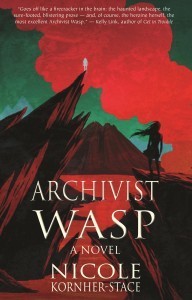
This might be a long answer. Fair warning. Okay, so. I’ve had these three characters kicking around in my head for about half my life, but I’ve never really known exactly how to put them together in a story because they live in very different times. In hindsight I’m not entirely sure why I wanted them to be in the same story, given that, but there it is. Very simply put, two of them are near-future supersoldiers and one of them is a very-far-future, very-post-apocalyptic ghosthunter-historian-priestess. In her world, ghosts are visible. The idea being, in the way that light pollution makes it hard for us to see the stars today, the sheer prevalence of humanity in its billions drowns out our ability to see the “unseen,” in this case ghosts. So, countless generations after the apocalypse, ghosts are visible to all, but nobody can really interact with them. The Archivist’s job is to capture and study them to try and glean clues about the long-dead world Before. Since ghosts can’t talk to people beyond mindlessly repeating their dying words (at best), this proves difficult, but it’s all they have. Unfortunately, being Archivist is not a voluntary position, and they’re ostracized from the town, respected and feared in equal measure, kept alive on offerings that the townspeople leave them. Kind of a witch and scapegoat all in one. Every year, on the Archivist-choosing day, she has to fight three upstarts from the pool of potential Archivists. She either dies and one of them takes her place, or she lives to remain Archivist another year. So the only way out of this position she doesn’t want is to be killed. This all is very Golden Bough-inspired, obviously. But honestly this book is a science fiction book embedded in a dark fantasy book, a mash-up of everything I love. Mythology, ridiculous action scenes, constellations, comics, Unlikely Alliances, partner stories (these people could be the stuff of a buddy-cop movie with very little difficulty), Descents Into the Underworld, etc. Then it turned into a YA novel because I wanted to write The Book I Would Have Wanted/Needed to Read as a Teen. So I guess the tl;dr: answer would be I just threw all that stuff into a pot together and stirred.
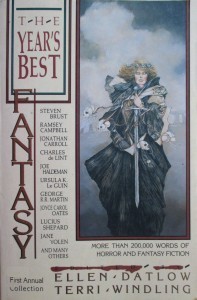 What was the story/book that made you think ‘I want to write!’?
What was the story/book that made you think ‘I want to write!’?
I’ve always wanted to write. But I think it was the Datlow/Windling Year’s Best Fantasy and Horror anthos that told me unequivocally what I wanted to write. Apart from my dad’s old SF collection, those were my first exposure to speculative fiction at age 10 or so, and they blew my mind right open.
Name five fictional characters with whom you’d like to lift weights.
Linda Hamilton’s Sarah Connor and Vasquez from Aliens. They would both smoke me and it would be glorious. Ysabeau Wilce’s Hardhands, because I would beat his ass, and that too would be glorious. Actually I’m just going to go ahead and count Sarah and Vasquez twice. They could both teach me plenty if I didn’t combust with envy first.
How do you link up with the Most Excellent Small Beer Press?
That’s a funny story, actually. I have a tendency to write things that get labeled as “unclassifiable,” so here, true to form, I’d written this book that several agents refused to touch. I got a pile of lovely personalized rejections basically saying there was nothing wrong with the book itself, just that it would be a hard sell, as a YA-ish with no romance or love triangle or high school drama. “Teens will find nothing to relate to” was a line that appeared more than once. Which is fair enough, but someday I’m going to propose a con panel that discusses why exactly books written for all other age groups (preschool picture books, early readers, middle grade, and adult) can be about anything, but for some reason YA has to have these tropes slotted in or it’s not YA. It’s not like our imaginations atrophy when we graduate from MG to YA and then regrow when we start reading adult books. It’s bizarre and insulting to teens. ANYWAY. Meantime, I was bemoaning my lack of agent-finding-success to Ellen Kushner and Ysabeau Wilce over dinner at Readercon a couple years back, and they gave me a lot of useful agent names (all of whom rejected me, wah wah) but Ysabeau also expressed interest in reading the manuscript. So I sent it on over. A while later I find out that she, being the sneaky sneaky instigator that she is, had sent it over to Small Beer telling them they need to read this now. And I guess they did, because then I got an email from Gavin saying they’d like to publish it, and I basically fell out of my chair. I’ve loved Small Beer’s books forever, and being edited by Kelly Link is pretty much as amazing a learning experience as you’d expect. It’s a hell of a thing to be part of, and they’re honestly the ideal publishing house for me. They gave me zero pushback on the lack of romance/love triangle/high school drama aspect. Kelly managed to intuit exactly what I was trying to do with the weaker points of the book and how to shore them up in just the way I would have chosen. And, as Ysabeau told me once, with Small Beer I’ll be at absolutely no risk of them coming to me and saying “okay so here’s your cover with your protagonist in a tight dress with her ass sticking out in the reader’s face.” And so it was!
Tell me about The Winter Triptych and its glorious cover by Oliver Hunter. 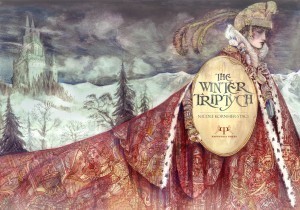
Oh my god, that cover. I have apologized to people who have bought that book because there’s basically nothing I could have put inside that cover that could ever possibly have lived up to it. Okay, so. When I was maybe ten? my dad found me some used-bookstore copies of those Year’s Best Fantasy and Horror anthos, and I devoured them. It was my first experience with fantasy and horror geared toward grownups, and if my parents had any idea what they were giving me, they probably would have held off a few years. Lucky for me, they didn’t! Anycase I started writing and submitting stories pretty much directly afterward. I think one of the high points in my writerly career is that I was getting personalized rejections from really high-end SFF magazines at age 12. I didn’t rewrite any of them after they got rejected a few times, just moved on to other projects. All but “The Winter Triptych,” which I found myself going back to and reworking every few years or so until it ended up in its present form. It’s a very (very) loose Sleeping Beauty retelling. With a monster. Everything’s better with monsters.
When you’re in the mood to read, who is your first choice?
I’m always in the mood to read! I don’t have a first choice, I’ll read everything. I like to read very different things back-to-back. Right now I’m very much enjoying ZEROBOXER by Fonda Lee, which is about zero-gravity MMA in space. Basically the best elevator pitch ever and I’m pretty jealous I didn’t write it first. Another book I really adore, which came out last year and flew way farther under the radar than it deserves, is THERE IS NO LOVELY END by Patty Templeton, which is an alternate history about the Winchester Mystery House. It’s funny and sexy and awesome. There are a number of writers that I will drop everything and run for a preorder page if I hear they have a book launching soon. A few off the top of my head: Haruki Murakami, Lauren Beukes, Jeff VanderMeer, Kelly Link, Margo Lanagan. Or another volume of SAGA. Oh my god so good. I may or may not have a recurrent daydream in which ARCHIVIST WASP gets a graphic novel adaptation illustrated by Fiona Staples. But I digress …
What’s your favourite short story ever and why?
Oooh. Hmm. I’m not sure I have one favorite. I read all kinds of stuff, and I have a deep abiding love of every kind of stylistic prose. The last short story that really broke my brain trying to figure out how the hell did she do that? was “Jack Daw’s Pack” by Greer Gilman. My favorite short story read recently was “And You Shall Know Her by the Trail of Dead” by Brooke Bolander for Lightspeed. Both very different and very interestingly told. I highly recommend both.
What’s next for Nicole Kornher-Stace and Archivist Wasp?
I recently drafted the sequel, and my first readers seem to really like it! I find that immensely reassuring since I’ve read very few sequels and written zero of them before this, so I’d gone into it pretty much blind. I loathe exposition and infodump, and my least favorite part of the sequels I have read is that section in the first couple of chapters that piles on the backstory for the benefit of people who are coming to the sequel first. So I had to figure out how to integrate all of that organically. Tricky! I’m pretty happy with it though — once it gets going it’s pretty fast-paced the whole way through, and I love these characters more than anyone I’ve ever written. I’m already plotting their third book. Honestly I could just write them books forever and be happy.
April 22, 2015
The Sourdough Posts: The Shadow Tree
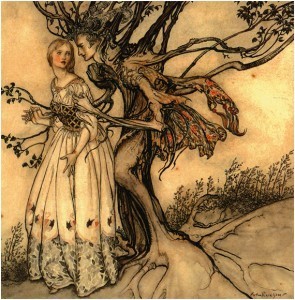
Alas, a Rackham will have to do.
So, I’ve been sort of missing writing about The Bitterwood Bible and Other Recountings and I thought ‘Why not give Sourdough and Other Stories the same treatment?’ Alas, I haz no Kathleen art for this collection (but my evil plan is to one day have a omnibus collection of all three books, all with Kathleen’s drawings *steeples fingers*).
It’s a while since I’ve really thought about these stories except in so far as how they related to the writing of The Tallow-Wife and Other Tales, so I decided to revisit them. They become particularly interesting when you realise that The Tallow-Wife will finish off the cycle of the Sourdough stories and it will also bring the character Ella, who makes her first appearance in “The Shadow Tree” and gets several mentions in Bitterwood, to her own end.
When I started this story I had the phrase ‘nigra sum sed formosa’ in my mind – again, I’d been reading Eco’s The Name of the Rose and it was one of the phrases that stuck with me. I’d been thinking about exiles and home and family, and what family might find unforgivable, and I’d also been reading Christina Rossetti’s Goblin Market and Angela Carter’s “The Erl-King”, as well as various versions of robber bridegroom tales. I thought about governesses and nursery maids, the sort of people left in charge of other people’s children and thought about how you can never be certain who or what you’ve brought into your home. I wondered what a character might do to find her way back to a home she’d thoughtlessly left and now missed more than life itself.
And thus was born Ella, with her darkness and her desires, her dislikes and her sense of putting things right in a fairly dreadful way.
The Shadow Tree
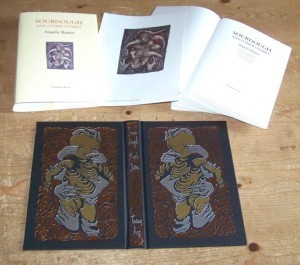
Original art by Stephen J. Clark
‘Why are you so dark, Ella?’ squeals Brunhilde, the king’s daughter. She is thirteen years old. It is the fourth time she has asked me the question since she and her brother invaded my rooms this afternoon. They are both verminous brats, exactly the kind I seek. The other one, the youngest, is not out of swaddling cloth so I cannot yet judge him. Sometimes it is simply enough to leave them to do harm where they may.
‘Yes, Ella. Why so dark? Do you roll in the dirt at night or sleep in the cinders?’ Baldur is fourteen and equals his sister in unpleasantness, occasionally surpassing her. Platinum blonde hair and violet-blue eyes, they are shining, flawed metal, the worst that a
royal house can offer: cruel, spiteful, selfish, beautiful, utterly confident of their position in life.
‘Nigra sum sed formosa,’ I answer, pleased at the blank stares they give. ‘Does your tutor not teach you Latin, then?’ I click my tongue, a gesture both despairing and scornful. I do not translate that I am dark but comely. ‘Ignorant children, what a blot upon the world.’
Brunhilde throws herself at me, and hangs off my skirt, trying to tear the fabric. If she had eyes and mind to see beyond the ordinary, she would notice that the material was fine once, a heavy brocade embroidered with gold and silver thread. The filaments are so aged and dull now their shine is lost to all but the most observant. She begins a chant and will not stop. ‘Why, why, why, why, why, why?’
‘Shut up, Brunhilde.’ Baldur sometimes sees further than his sister, sometimes he tries to dig. She drops away, sits on the cold floor and sulks. ‘You do not know your place, Ella.’
‘My place is here for the moment, for as long as I choose,’ I say. I do not mention that warming their father’s bed now and then gives me licence to say what I please—within measure. My position as herbalist gives me power, too. I supply the physician with the medicines upon which his reputation rests. Ladies of the court come to me for unguents to keep their skin soft, or for drafts to get rid of inconvenient pregnancies. The Queen occasionally asks for something to make her husband sleep and so relieve her of his demands for a night or two. Men want love philtres to help them do their best by their womenfolk, or to make them eloquent before the King. The Archbishop, Serenus, comes more often than most. I have been here six months, threading my way through the life of the palace and this little city of Lodellan, which thinks itself large. Soon it will be time to go.
‘You do not speak like a servant. You do not behave like a servant.’
‘Yet I am a servant,’ I finish curtly. ‘Now, get out of my room, and take your squalling sibling with you.’
‘You cannot order us about!’ squeaks Brunhilde.
‘I can and have. Now out, or there will be no stories tonight, nor for a sennight to come.’ Here is my real power over them: the tales I tell. They have become small addicts, to our sessions and the drops of mandrake I put in their milk. The nights when I am not telling their father fables of a different sort, I spend beside their beds, recounting myths and legends to take into their dreams. Even though the children are vile, this weaving of words is a pleasure for me, and it furthers my ends. I suffer no illusions: they do not love me. As long as I provide an amusement, it will stave off the moment when they turn on me.
‘Not like the one you told last night, Ella,’ Baldur says warily. I shake my head, hide my smile. I gave them the history of the Erl-King and in the morning they both woke with tears on their cheeks.
‘No, I’ll tell you something exciting, something secret,’ I promise.
When they have gone, I unlock the door to my workroom and step inside. A thin cat detaches herself from the shadows under one of the benches. She glides around my skirts, mews to be gathered up. She’s black, with the greenest of eyes, tiny and frail still. I rescued her from the children a month ago; they were tormenting her in the stables, had already executed her kittens and dangled their limp bodies in front of her. For a long while, the cat wouldn’t eat, but eventually I coaxed milk into her mouth and loved her into living. She is gentle and sad. For their efforts, Brunhilde and Baldur spent two weeks vomiting and shitting, fed with one of my potions, and their sheets sprinkled with a compound that made them break out in red, itching spots.
The cat’s face against mine is warm and she is soft in my hands. I hold her like a child, and survey the room. It is dim because some of the plants and powders I work with do not like the light. It smells musty, but layered with sweetness and something bitter and dark at the very base, like rotted roses. In the end, it reminds me of home, a comfort and an ache at the same time, to remember a place and an exile from it.
Hesitantly, I uncover the mirror that waits in one corner. It’s big enough to show my face and torso, faded dress, cat in arms. My skin is deep olive, burnt by the sun as I tramp the hills beyond the forest for herbs, my face an oval set with dark eyes and an unbalanced mouth—upper lip thin, the lower full. My brows are straight, and my hair as black as the cat’s fur. I have the look of a gypsy, a wanderer.
I wonder if perhaps my time has passed and I can return. In hope, I touch the glass, feel it cool under my fingertips, wish that I could travel through it, through the doors between worlds, back to my own place. My exile isn’t yet done. The surface remains hard, unbroken, impenetrable. The cat makes a soft noise, like sympathy. I bury my face in her fur.
***



